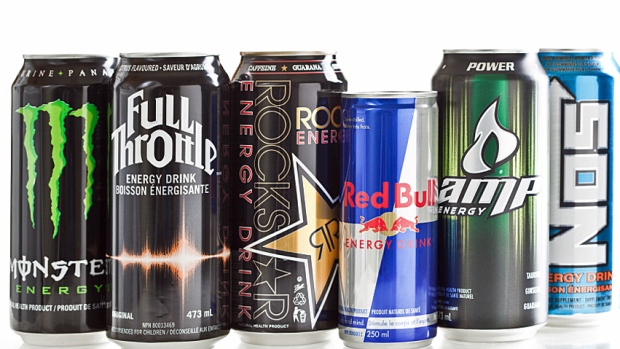Energy Drinks' Non-Caffeine Ingredients May Affect Heart

The multiple ingredients in different brands of energy drinks need more scrutiny, researchers say. (Canadian Press)
Concerns about energy drinks may be too focused on caffeine, according to a study that found other ingredients in the beverages may affect heart health.
The findings, published Wednesday in the Journal of the American Heart Association, come from a small study of 18 healthy adults who consumed either two cans of a commercially available energy drink or a control drink with the same amount of caffeine but not the other components.
In a survey by Canadian researchers, 76 per cent of Canadians aged 12 to 24 reported consuming energy drinks, and 16 per cent said they'd had more than two a day, the maximum recommended by Health Canada.
Public health officials have focused on caffeine in the products and recommend limits such as restricting sales and marketing to youth.
Excess caffeine consumption was also what interested U.S. researchers who were concerned that nearly 15 per cent of American military personnel deployed to Afghanistan in 2010 reported consuming three or more cans of energy drinks per day.
Emily Fletcher and her team at David Grant Medical Center on Travis Air Force Base in California randomly assigned 18 healthy volunteers to consume 946 millilitres, or two cans, of a commercially available energy drink. A week later, they downed the same amount of a control drink with equal amounts of caffeine as the energy drink.
The investigators used an electrocardiogram (ECG) to track how electrical activity changed in the heart for 24 hours after consuming the drinks, including a change called QTc prolongation, which can be associated with life-threatening arrythmia.
In this small sample, the researchers found the prolongation measure was significantly higher after participants consumed the energy drinks versus the caffeine-only drink.
Concerning findings
The investigators noted several drugs have been pulled from the market in the U.S. for causing ECG changes of a similar magnitude to what they observed in their experiment. Health Canada has also warned of risks associated with products containing the herb ephedra or ephedrine, which is associated with QTc prolongation.
Fletcher and her team say it was unlikely caffeine was responsible for the effect.
"Our findings are concerning since caffeine likely does not affect the QTc interval based on previous studies. Further investigation of other energy drink constituents is necessary," the study's authors said.
"If you drink one a day, probably not a big deal. If you drink one a week, probably not a big deal. If you're drinking three or four a day, you have to wonder," said Dr. Michael Rieder, a professor at Western University in London, Ont., who was not involved in the study The idea that high-volume consumption of energy drinks might have cardiovascular effects is concerning and likely reflects the dose, he said.
Mix of ingredients
Just as young people aged 12 to 24 are taught to view alcohol responsibly, parents and physicians could encourage similar risk reduction and responsible behaviours around energy drinks, Rieder suggested.
The researchers noted the heart changes they observed are "not alarming" for healthy individuals. They suggested those who have high blood pressure, underlying cardiac conditions or other health issues might want to avoid or use caution when consuming energy drinks until their impact on heart health is better understood.
The multiple ingredients in energy drinks, such as taurine, L-cartinine and panax ginseng, can alter heart rhythms, and the researchers said their use individually and in combination needs more scrutiny.
There is a shortage of good-quality research in this area. Previous studies may not have found the same effects but they might have used lower doses of energy drinks, didn't monitor people for as long, didn't have a control or used different products.
Previous studies also suggest that people should exercise caution when combining alcohol or illicit substances with energy drinks since cardiovascular events could be triggered or exacerbated.
Story Credit: http://www.cbc.ca/news/health/energy-drinks-heart-1.4087058


